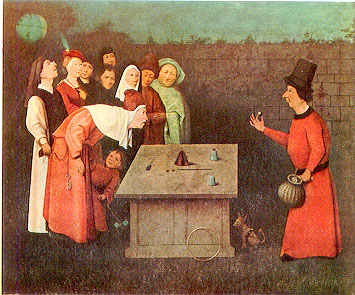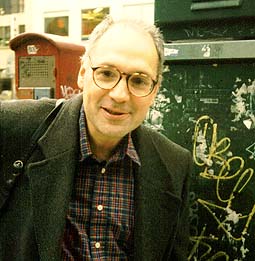
|
J A C K E T # 5 |
|
this material is copyright © Charles Bernstein and Jacket magazine 1998 The URL address of this page is http://jacketmagazine.com/05/sulfur.html please read the copyright notice and see the links at the foot of the page back to Jacket # 5 contents page back to Jacket's homepage |
| |
Charles Bernstein The Value of Sulfur from My Way: Speeches and Poems, The University of Chicago Press, 1999. This piece was originally written in late 1988.  FOR THE PAST SEVERAL YEARS I have been a correspondent for Sulfur magazine. Correspondent from where? I like to think of myself as the correspondent from the outer reaches of language, because I think language, along with outer space, is the last wilderness, the last frontier - our collective inner space, as strange as the unexplored depths of the oceans, as wild as the word Emily Dickinson proclaimed was language's wildest, just the one syllable, NO.
FOR THE PAST SEVERAL YEARS I have been a correspondent for Sulfur magazine. Correspondent from where? I like to think of myself as the correspondent from the outer reaches of language, because I think language, along with outer space, is the last wilderness, the last frontier - our collective inner space, as strange as the unexplored depths of the oceans, as wild as the word Emily Dickinson proclaimed was language's wildest, just the one syllable, NO.Language is a wilderness that, unlike others, can never be conquered, or exhausted; but it can be made to accommodate: to submit, assimilate, compromise, deny. In contrast, I correspond for a poetry that dwells, without disavowing - that is, that dwells in ways that may make readers anxious - not only on the resplendent and difficult to contain, but also on the disturbed, confused, broken, awkward, difficult, dark. This is a poetry committed less to opposition than composition - a com(op)posing that values inquiry above representation, resistance over adjudication. For a stubborn aversion to the conventions of expression, even for the sake of the aversion, can be necessary relief in a society that confuses palatability for communication, packaging for style, tiny bytes of message for meaning. In a culture where national political discourse religiously avoids complexity and journalism swings maniacally from the parroting of PR releases to the endless repetitions of the same rehearsed banalities (whether it be celebrity interviews or the close-up faces of disaster victims), there is a need for a poetry that is not just more of same. & this is a need that grows in direct proportion to poetry's much-heralded denial, as in the cover story of last month's Commentary (August, 1988) - "Who Killed Poetry?" - an article so proudly shallow that it's only point seemed to be that it wished the art of writing could be killed, as if poetry was some kind of weirdly persistent mosquito that hovered around the author in the throes of composition: call it language's conscience, its consciousness of itself. | |
| |
In the face of smugness like this, it becomes necessary to insist on the value of poetry that goes beyond the moralizing subjectivity that characterizes so much of the verse of our time. Whether a poem is innovative or traditional may not seem all that important if the ability to read is in question; but larger social and public issues may elide the aesthetic value that a poetics may insist upon, against all odds. Yet the adversarial, in its passion, may also engender divisiveness. & indeed divisiveness is an unfortunate, but perhaps inevitable, legacy of alternative traditions in American poetry. As long as most poets of value in our culture continue to feel, with justification, unrecognized and unappreciated - not so much opposed as ignored - this legacy will be hard to reverse. | |

| |
| | For while public discussions of poetry often focus on the building of "community", those of us who live our lives as poets are equally aware of the often blistering hostility that greets new poetry, not only from those who would be expected to dislike this work, but also, and often with more vitriolic bias, from those who would seem to be interested in related work (as a recent public tantrum in Sulfur, by one of its contributing editors, attests). Alternative institutions, as we have learned on the left, are not always sanctuary from the reductive, the dismissive, the self-righteous. They are not necessarily free from a nostalgia for past solutions untransformed to account for the present moment, nor, for that matter, from wild-eyed obliviousness to old and problematic solutions offered as revolutionary new ones. The poet's life is one of quiet desperation, although sometimes it gets noisy. Everywhere undermined by apathy, suspicion, competitiveness, outside the welcome friendship of those similarly situated, it seems poetry "itself" has to be defended. Many days I feel like one of those 50s street vendors demonstrating multi-purpose vegetable cutters; the flapping hands and jumping up and down may generate a small crowd because there remains interest if not in the product at least in the humiliation of trying to sell something few seem to want. I flip through this week's Nation (October 3, 1988) and notice a letter to the editor by their own small press critic. He suggests that the "clarity" that the New York Post "demands of its sports writers" is a model that poets who wish to be political should emulate. Is it just my pessimism that makes me feel that this reflects an ever deepening crisis in our culture - a contempt, even in the alternate press's space for alternate presses, for intellectual and spiritual articulations not completely assimilated into and determined by the dominant culture's discursive practices? Discursive practices marked by endless chronicles of winners and losers, organized violence, and performance measured by the clock. & why exactly are the four words "dominant culture's discursive practices" any worse to someone of this persuasion than such approved formulations as "major league batting practice"? Perhaps poetry, like the wilderness, has to be denied as part of an effort to conquer it. For to admit that there is wilderness, or poetry, is to lose the battle to overcome it. Why do things, except for money, or sport, or family? This is something that seems no longer obvious. & if you say civic, it still doesn't explain that the community for which you may wish to speak has few voters or consumers, or perhaps is only a figment of your imagination, or a vision of a community that may some time come to be. It still doesn't explain that the community for which you speak may be a people that have vanished, or been expelled, or vanquished. Our history is one of ghosts, whose voices we can sometimes hear sighing in lines more often than not denied the status of communication because they make too much sense, but sense of the wrong kind. Each of us is entitled to our taste and perhaps deserves it. There is no point in disputing preferences, if presented as such; but it is another matter when such preferences are stated with the inevitability of endless repetitions of the same, when taste insists on its right to be proscriptive but not to be challenged, or when statements of taste turn to arguments that fundamentally distort the sources, motivations, and accomplishments, whether it be of the radical modernists of the 10s and 20s, the New American poets of the 50s and 60s, or poets today: decrying the absence of meaning or decorum; the abandonment of coherence, sentiment, or emotion; the loss of the music of traditional verse forms; and other various and sundry excesses. Seventy-five years ago, it was the stance of many avant-garde movements to proclaim just these feats, partly just to "bug the squares". But these claims have grown tiresome over time and, in any case, never really fit the work in whose name they were spoken, since really what was rejected was not meaning or music or even literary "tradition" but outworn, or no longer viable, ways of conceiving of them. A poetry or poetics that is skeptical of fixed values will provoke a rather constant denunciation as valueless. Such rebukes can be encouraging in that they show the continuing need to rattle against the pieties of those certain (if insecure) in their beliefs and complacent (if anxious) in their condescension. An pro-vocative poetry will provoke those who would shirk from their own responsibility to make values rather than mimic them. The test for such a poetry is that it discomfits those who rely on an exclusive claim to truth and authenticity in order to legitimate their practice. As I have learned from my many years on my own private Borscht Belt, people without a sense of humor do not laugh at jokes. And if you want to survive in show business, don't let the hecklers get you down, make them part of the show. The poetry for which I correspond represents less a unified alternative poetics than a series of sometimes contentiously related tendencies, or proclivities, and, especially, shared negations (concerted rejections) of American official verse culture. For truly these projects-in-language are not restricted or exclusive; there is no limit to those who can, or have, or will participate in this work, which is open-ended and without proscriptions: not a matter of Proper Names but of Works, and perhaps not even a matter of works but of how readers read them. And maybe those who say that the mainstream is a projection, or desperate posturing, and that these alternate, alternating, traditions are the active matrix of American poetry, are right. For official verse culture, now as always, is under siege, undermining itself, and able to occupy only a tiny table at the banquet of culture: decked with medals and pride but notably less positioned for access to the stage than many of its designated, and undesignated, others. Just now in North America there is an intense density of poetic activity, so that it becomes difficult to keep up with all the work that excites interest and involvement. The work about which I wish to correspond tends to be preoccupied with finding the possibilities for articulation of meanings that are too often denied or repressed by a (multinational) culture that we are always being subjected to, that we are indeed subjects of, and which, moreover, can be understood as its nowhere explicated subject. Poetry which is political not primarily in its subject matter, or representation of political causes, however valuable that may be, but in the form and structure and style of the poems, and in the attitude toward language. Against the onslaught of a pervasive, and facile, insistence that there is no escape from the simulations of commodity culture, it becomes political to hold out for meaning: not the meaning that is the prepackaged message of an authorized and syntactically normalized, grammatic, decorum; but an always active, probing consideration of meaning as social, corporeal, multidimensional; a meaning that is not fixed but acted out in imperfect, asymmetric counterpoint to the labors that simultaneously engender each day. | |
| |
- from Charles Bernstein, My Way: Speeches and Poems, The University of Chicago Press, 1999 "Verse is born free but everywhere in chains. It has been my project to rattle the chains." (Charles Bernstein, from 'The Revenge of the Poet-Critic')  From the press's publicity: "In My Way, (in)famous language poet and critic Charles Bernstein deploys a wide variety of interlinked forms - speeches and poems, interviews and essays - to explore the place of poetry in American culture and in the university. Sometimes comic, sometimes dark, Bernstein's writing is irreverent but always relevant, 'not structurally challenged, but structurally challenging.'" February 1999, 360 pages (est.), 6 x 9 ISBN:0-226-04409-2 Cloth $46.00tx ISBN:0-226-04410-6 Paper $18.00 The University of Chicago Press 11030 S.Langley Avenue, Chicago IL 60628 USA tel 1 800 621 2736, (773) 568 1550, fax 1 800 621 8471, (773) 660 2235 Charles Bernstein is David Gray Professor of Poetry and Letters at the State University of New York at Buffalo. He is the author of two collections of essays, Content's Dream and A Poetics, and twenty books of poetry, most recently Dark City, Rough Trades, and, with Susan Bee, Log Rhythms. Photo: Charles Bernstein, New York, November 1997, copyright © John Tranter, 1997 | |
| J A C K E T # 5 Back to Jacket # 5 Contents page Select other issues of the magazine from the | Jacket catalog | Other links: | top | homepage | bookstores | literary links | internet design | Copyright Notice - Please respect the fact that this material is copyright. It is made available here without charge for personal use only. It may not be stored, displayed, published, reproduced, or used for any other purpose | about Jacket | |